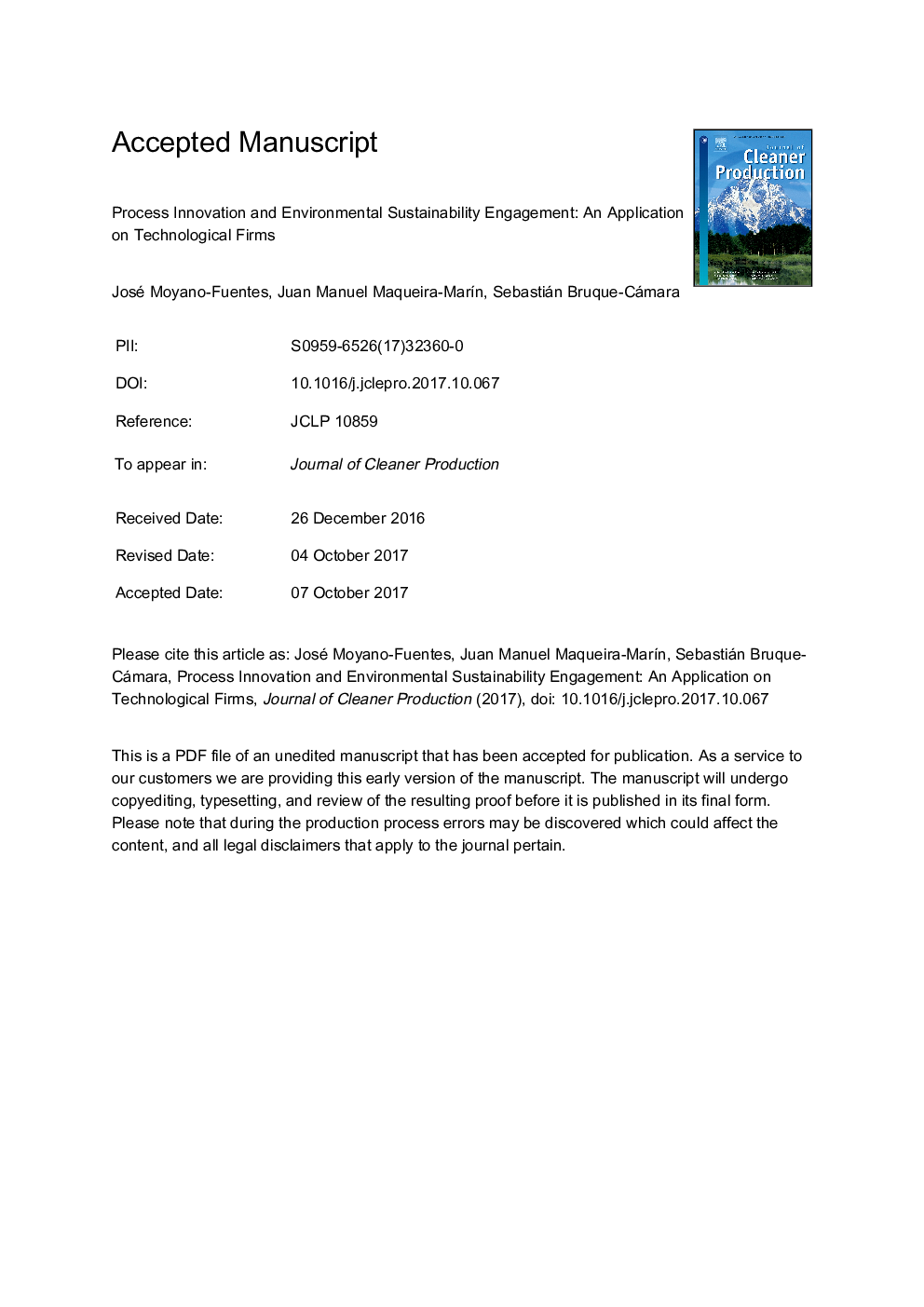| کد مقاله | کد نشریه | سال انتشار | مقاله انگلیسی | نسخه تمام متن |
|---|---|---|---|---|
| 8100282 | 1522082 | 2018 | 44 صفحه PDF | دانلود رایگان |
عنوان انگلیسی مقاله ISI
Process innovation and environmental sustainability engagement: An application on technological firms
ترجمه فارسی عنوان
نوآوری در فرآیند و تعامل پایدار محیط زیست: برنامه کاربردی در مورد شرکت های فن آوری
دانلود مقاله + سفارش ترجمه
دانلود مقاله ISI انگلیسی
رایگان برای ایرانیان
کلمات کلیدی
نوآوری در فرآیند، تعامل پایدار محیط زیست، عقلانیت اقتصادی، تئوری نهادی، پارک علم و فناوری،
ترجمه چکیده
این مطالعه با تجزیه و تحلیل نحوه تصمیم گیری استراتژیک داخلی، نوآوری در فرآیند، با برخی از ویژگی های محیط خارجی برای توضیح تعامل پایدار محیطی توسط شرکت ها، به بررسی ادبیات فعلی کمک می کند. بر اساس مبانی اقتصادی و سازمانی، سه فرضیه برای بررسی رابطه بین نوآوری در فرآیند و تعامل با پایداری محیطی، با توجه به نقش بازی های رقابتی و نهادی که در آن شرکت فعالیت می شود، پیشنهاد می شود. فرضیه ها با استفاده از نمونه ای از 239 شرکت در بخش های پیشرفته که در پارک علم و فن آوری اسپانیا کار می کنند مورد آزمایش قرار می گیرند. با استفاده از یک آزمون غیر پارامتری، نتایج نشان می دهد که شرکت هایی که نوآوری فرآیند را درگیر در پایداری محیطی می کنند. بر اساس مدل رگرسیون سلسله مراتبی، نتایج بیشتر نشان می دهد که نوآوری فرآیند بیش از رقبای مرتبط با مشارکت پایدار محیط زیست است. با این حال، زمانی که در مدل در نظر گرفته می شود به عنوان یک عامل توضیحی، اثر ساخته شده توسط محیط سازمانی از بین می رود. علاوه بر این، نتایج نشان می دهد که با وجود اینکه شرکت ها سال ها در پارک علمی و فن آوری فعالیت می کنند، ارتباط بین نوآوری در فرآیند و تعامل با پایداری محیطی حتی منفی می شود. این یافته ها نشان می دهد که ارتباط بین نوآوری در فرایند و مشارکت پایدار وجود دارد. شرکت ها تمایل دارند بر هر دو محدودیت های اقتصادی ناشی از محیط رقابتی خود و فشارهای نهادی توسط ذینفعانشان، هرچند به شیوه ای که در طول زمان به طور مساوی توزیع نشده، برآورده شود. به طور مشابه، شرکت ها بیشتر در معرض فشارهای نهادی در ابتدا و نیازهای اقتصادی در مراحل بعدی تکامل خود در پارک های علمی و فن آوری قرار می گیرند.
موضوعات مرتبط
مهندسی و علوم پایه
مهندسی انرژی
انرژی های تجدید پذیر، توسعه پایدار و محیط زیست
چکیده انگلیسی
This study makes a contribution to the current literature by analysing how an internal strategic decision, process innovation, interacts with some features of the external environment to explain environmental sustainability engagement by companies. Drawing on economic and institutional rationales, three hypotheses are proposed to examine the relationship between process innovation and environmental sustainability engagement, considering the role played by the competitive and institutional context in which the firm operates. The hypotheses are tested using a sample of 239 companies in high-tech sectors operating in Spanish science and technology parks. Using a non-parametric test, the results show that companies that perform process innovation are more engaged in environmental sustainability. Based on hierarchical regression models, further results show that performing process innovation more than competitors is related to higher environmental sustainability engagement. However, when time is considered in the model as an explanatory factor, the effect exerted by the institutional environment fades away. Furthermore, the results show that as companies accumulate years operating in a science and technology park, the relationship between process innovation and environmental sustainability engagement even becomes negative. These findings suggest that there is a strong link between process innovation and sustainability engagement. Companies tend to satisfy both economic restrictions posed by their competitive environment and institutional pressures exerted by their stakeholders, albeit in a manner that is not evenly distributed over time. Similarly, firms devote more attention to institutional pressures at the beginning and to economic requirements in later stages of their evolution within science and technology parks.
ناشر
Database: Elsevier - ScienceDirect (ساینس دایرکت)
Journal: Journal of Cleaner Production - Volume 171, 10 January 2018, Pages 844-856
Journal: Journal of Cleaner Production - Volume 171, 10 January 2018, Pages 844-856
نویسندگان
José Moyano-Fuentes, Juan Manuel Maqueira-MarÃn, Sebastián Bruque-Cámara,
